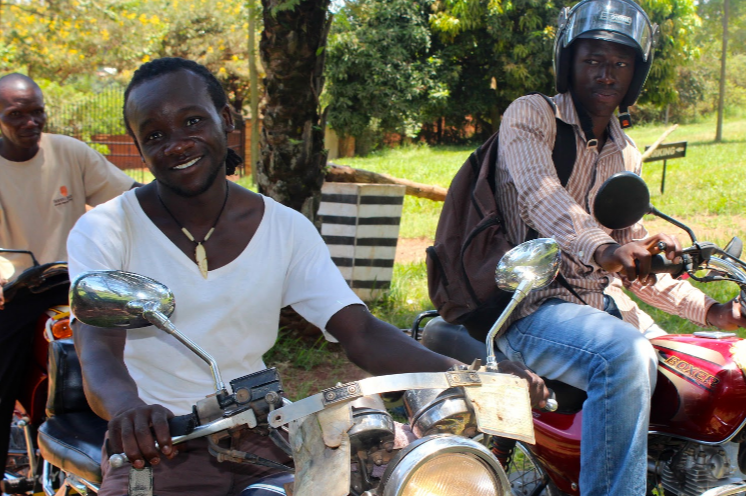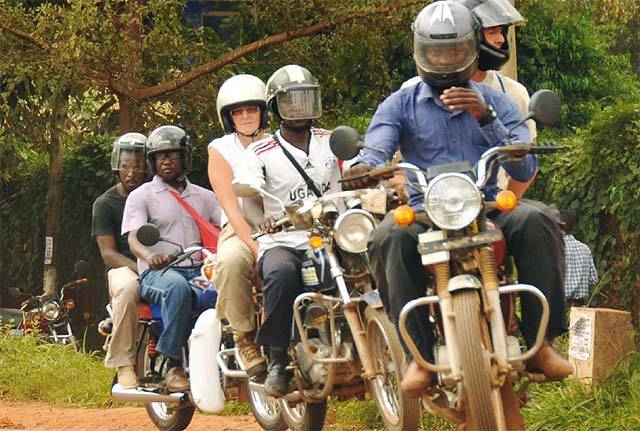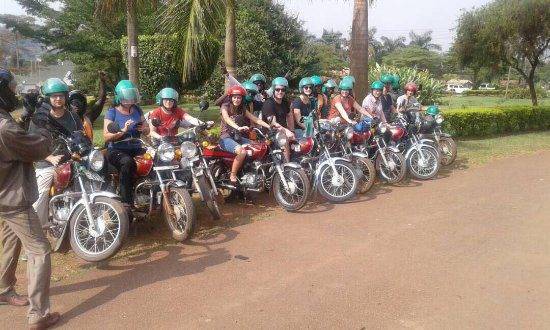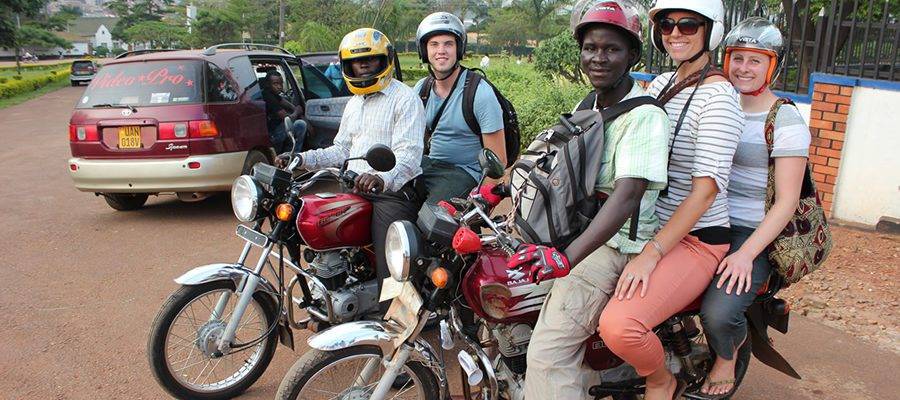Boda Boda Safaris Are Changing The Face Of Tourism In Uganda And It All Began With A One-Time Stowaway

If you check out Walter’s Tours on TripAdvisor, you’d probably be taken aback by the sheer amount of glowing recommendations left behind by tourists who appear to be quite pleased with the quality of service they enjoyed during guided excursions through Kampala, the Ugandan capital, by means of a motorcycle taxi (also called Boda Boda).
Well, these guided motorcycle excursions happen to be the stock-in-trade of Walter’s Tours; a company set up by Walter Wandera some eight years ago. Wandera, who initially left his country as a stowaway without realising it, currently employs up to 30 bike riders who meander through the dense traffic – an ever-present feature of Kampala roads – while helping guests take in a portion of the city’s main attractions and choicest destinations.

It sure looks like Wandera is doing good for himself these days but beneath the current appearance of growth and progress lies a story that could’ve just as easily ended in disaster.
Way before any semblance of quiet and calm came through, Wandera was in a bad place having been a school dropout, a homeless person, and even an illegal immigrant at some point. How he’s managed to turn the situation around, though, has been nothing short of inspirational.
Wandera had a forgettable childhood as he grew up in a poor community in Mbale, Eastern Uganda. Born into a family that struggled to make ends meet, he was one of seven children who were often in and out of school since his parents had trouble taking care of the basic needs of the family, not to mention paying tuition fees.
But the young boy got the hint early enough, taking the initiative to put in work on a number of odd jobs from a young age in an effort to pay his way through school. Well, he did come good in that regard as he managed to see himself through secondary school.
But going further than that on his own was always going to be a reach. Now, here was 19-year-old Wandera, fresh from secondary school in 2006, and without any hope of going to college. At that young age, he had come to a crossroads as he mulled over what to do with his life. Before long, he found himself on the streets.
“I was homeless – which made it even harder to find work,” he told How we made it in Africa.
Wandera lived this destitute life for a while until he decided to take measures that could be described as drastic, or even foolhardy. Looking for opportunities to start out fresh elsewhere, Wandera settled for a stowaway move since he had no other means.
One fateful day, he jumped onto the back of a large truck which was passing through the city and when the vehicle eventually came to a stop after several hours, he found that he had turned up in another country as an illegal immigrant. Without knowing it, Wandera had journeyed to Juba, the capital of what is now South Sudan.
“I didn’t know what the destination would be. I just went,” he recalls. “I didn’t have any papers or anything, and the fact that I was on a truck that carries goods – well, I guess I was lucky to have just ended up there.”
And just like in his homeland, Wandera was once again a homeless individual that was struggling to find work – but this time in a foreign land. After weeks of milling about aimlessly and feeding on whatever he could lay hands on, he did get some respite when he met another Ugandan who was in the business of selling cold water from cooler boxes on the streets. It was this same person who got him hooked up with a similar business.

He wasn’t exactly making much from the cold water business but at least, he was gainfully employed – he didn’t have to go begging before he could eat. Wandera also had to learn the local languages, with ‘Arabic Pidgin’ being commonly spoken in Juba. For around two years, he worked different odd jobs, and eventually found permanent employment in a pharmacy.
Even though it seemed his stowaway move was not a bad idea, after all, there was only so much he could do in his new surroundings. True, he had managed to get a stable job and all, but he was always in danger of being found out and captured by the authorities given that his presence in the country was illegal. And he did get caught and jailed a couple of times.
“There seemed to be a [police] crack down all the time and you could get arrested after working for three months and then spend all the money you saved trying to get yourself out of jail… I didn’t look like I was South Sudanese so people could tell – and I was running away from the police all the time.”
Also, being a foreigner, Wandera didn’t always get the best treatment from the locals and some times, the hostility was almost unbearable. He knew he’d have to return to his country sooner rather than later. So, he began to save up for his return to Uganda.
And in early 2009, with just over USD 200.00 in his pocket, he managed to cross the Sudan-Uganda border and travel to Kampala.
Crossing the Sudan-Uganda border may sound routine but it was no walk in the park. It was a lot more trouble than when he first found his way into the country.
“I took a bus from Juba and reached the border but, because I had no legal documents, I jumped out of the bus at the border on the Sudanese side and walked through the bush into Uganda. I then got a bus from the northern part of the country towards Kampala. It took me about three days.”

Once in Kampala, with 30 percent of the money that accompanied him from South Sudan, he made a down payment for a motorcycle and started working as a Boda Boda rider (commercial motorcyclist) in the city.
Most of the money he made during the first few months went into paying off the rest of the money he owed for the motorcycle he had initially only partly paid for.
He managed to do just that with his earnings, and somehow, there was still something left to pay for a computer engineering course at a local institution offering vocational training.
During this time, he would study during the day and work at night – getting only a few hours of sleep daily in the crampy room his sister had let him have in a slum in Kampala.
Six months later, he moved into his own place and called it quits with the vocational training course having decided to try out something else. This decision may have been inspired by an idea that hit him while on his daily trips as a Boda Boda rider.
In his line of work, Wandera had become quite accustomed to giving foreigners quick rides to and from hotels, and many other places. Because his English was decent, he often engaged such individuals in conversations during those trips.
Wandera identified something of a recurrent feature in all those conversations – it always came down to questions about tours one could take in Kampala. “No” had become his default response to the question but as they wouldn’t stop asking, he soon got thinking.

Wandera started to educate himself about Kampala’s heritage sites and tourist attractions – making sure he could recite the history behind each site. By 2010, he had started marketing his Boda Boda tours online. And things started to get better from that moment, however slowly.
Fast forward to this day and Walter Wandera one-man ‘Boda Boda safari’ has grown to become a company that conducts motorcycle tours for between 3 to 15 clients daily, having added some other tour guides to his employ. These days, exploring similarly promising markets in Rwanda, Kenya, Tanzania, and Congo (which is home to an active volcano), is well within his grasp.
Looks like someone finally made lemonade out of those lemons life just happens to hand out generously.